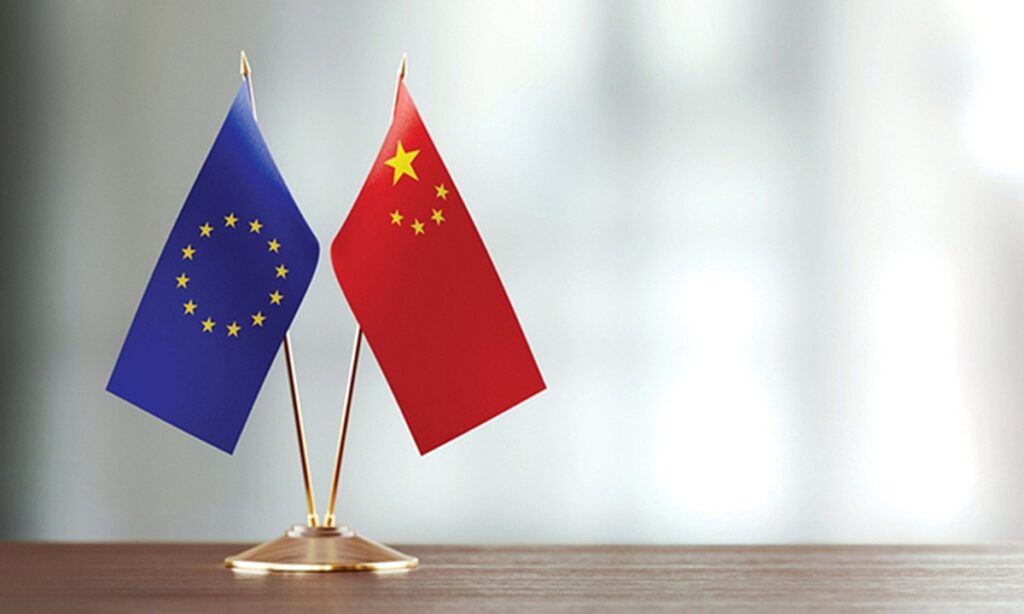It is more urgent than ever for Europe to accelerate its energy transition progress to reverse the awkward energy supply situation, which may represent broad room for green cooperation with China that is also facing challenges in meeting its carbon neutrality target.
Leaders from nine European countries, including Belgium, the Netherlands, Luxembourg, France, Germany, the UK, Ireland, Norway and Denmark, met in the Belgian port city of Ostend on Monday to discuss ways of expanding renewable generation in the region to meet climate goals and strengthen energy security, Reuters reported.
According to a draft of the leaders’ summit declaration, seen by Reuters, the nine countries pledged to increase the North Sea offshore wind capacity to 120 gigawatts (GW) by 2030 and 300 GW by 2050, from the current level of 25 GW.
The commendable ambitious pledge by these European countries aimed at boosting wind power capacity is part of the region’s recent efforts to accelerate a transition from fossil fuel to renewable resources. In the wake of the Russia-Ukraine conflict, Europe’s energy system has been facing unprecedented challenges, and the region has been more aware than ever of the urgency and necessity of its energy transition.
Yet, a reality Europe has to acknowledge is that the region’s energy transition faces growing economic, environmental, technological and geopolitical challenges in the context of intensified geopolitical rivalry. Take wind power for example, European companies, including Denmark’s Orsted and Norway’s Equinor, said their sector was too small to support the expansion of the wind power generation capacity, calling for more policy support and funding, according to Reuters.
Therefore, if Europe wants to accelerate its energy transition process, that means it needs to reach out for cooperation, and China is one that it cannot shun. At present, China is also pushing forward with its own energy transition. From China’s perspective, this is clearly an area where more cooperation with the outside is needed to make faster progress, and Europe stands out as an obvious partner.
Based on the past experience of China-Europe cooperation in solar energy and other renewable energy resources, green energy industries in China and Europe have remarkable complementary advantages, which could serve as a solid foundation for deepening cooperation.
On the one hand, the scale effect of China’s new energy industry supported by its domestic manufacturing strength is significant, which can help reduce the time span and costs needed to advance Europe’s energy transition.
On the other side, European new energy industry has a relatively long history of research and development in terms of energy transformation technology. And more technological cooperation could accelerate the transformation and application of new energy technologies in China, improving efficiency for energy transition.
A number of industrial conferences on China-Europe green energy cooperation that have been held recently is also an obvious indication of the strong momentum for cooperation.
On April 15, the 2023 China-Europe Hydrogen Energy Industry Forum was held in Baotou, North China’s Inner Mongolia Autonomous Region, with the aim of seizing the opportunity of energy transition to deepen China-Europe exchanges and cooperation for the high-quality development of the hydrogen energy industry.
Last week, the first Sino-European Green and Innovative Development Conference was held in Jiangmen, South China’s Guangdong Province.
Despite the changeable geopolitical environment, there is already growing awareness among industry players in both China and Europe that green energy will be a new and important area of cooperation between the two sides, and a strengthened collaboration will greatly reduce the risks and costs incurred by the uncertainties in the energy transition for both sides.
Chinese Commerce Minister Wang Wentao on Monday met with Valdis Dombrovskis, the European Commission’s executive vice president and commissioner for trade, exchanging views on topics that included promoting bilateral trade and investment, maintaining the stability of the industrial and supply chains and expanding cooperation in green and low-carbon investment, China’s commerce ministry said on Tuesday.
Broadly speaking, green cooperation is also an important lever for deepening bilateral cooperation, especially under the current situation. Cooperation between the two sides will play a crucial role in enhancing mutual trust.
(Global Times)




